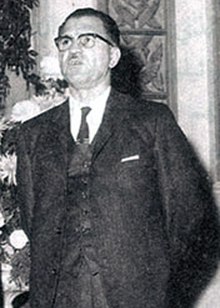Abd ar-Rahman al-Bazzaz
| Abd al-Rahman al-Bazzaz | |
|---|---|
 |
|
| Acting President of Iraq | |
|
In office April 13, 1966 – April 16, 1966 |
|
| Prime Minister | Himself |
| Preceded by | Abdul Salam Arif |
| Succeeded by | Abdul Rahman Arif |
| 51st Prime Minister of Iraq 5th Prime Minister of the Republic of Iraq |
|
|
In office September 21, 1965 – August 9, 1966 |
|
| President |
Abdul Salam Arif Abdul Rahman Arif |
| Preceded by | Arif Abd ar-Razzaq |
| Succeeded by | Naji Talib |
| Personal details | |
| Born | 1913 Baghdad |
| Died | 1973 London |
| Nationality | Iraqi |
| Political party | Iraqi Arab Socialist Union |
| Alma mater |
University of Baghdad King's College London |
| Occupation | Dean of Baghdad Law College |
| Religion | Sunni Islam |
Abd al-Rahman al-Bazzaz (Arabic: عبد الرحمن البزاز; l913–1973) was a politician, reformist, and writer. He was a pan-Arab nationalist and served as the Dean of Baghdad Law College and later as Prime Minister of Iraq. Al-Bazzaz main political project was the professionalization of the government through increasing access to civilian expertise. That civic agenda came at the expense of the military. Al-Bazzaz was charged by the Ba'athist-dominated government of participation in activities against the government and he was tortured and imprisoned. Al-Bazzaz was finally released because of illness in 1970 and moved to London for treatment where he later died in 1973.
Abd al-Rahman al-Bazzaz was born to a Sunni Muslim family in Baghdad. His brother was the plant ecologist, Fakhri A. Bazzaz.
He completed both elementary school and high school in Baghdad. Al-Bazzaz graduated from the Baghdad Law College in 1934. In 1938 Al-Bazzaz completed his law studies at King's College London. In the 1930s, he became an affiliate of the Muthanna and Jawwal clubs, the academic focus of which was pan-Arabism and encouraging Arab nationalism. The Muthanna Club was established in Baghdad in 1935 and was an influential radical pan-Arab and pan-Islamic fascist society which collapsed with the Rashid Ali al-Gaylani rebellion. In 1941 al-Bazzaz supported the failed rebellion against the British. After that unsuccessful attempt at revolution, al-Bazzaz was incarcerated during World War II but he was released at the end of the war.
After the war, al-Bazzaz was chosen as the dean of the Baghdad Law College. In 1956 he was forced out by the government for protesting against the invasion of Egypt by France, the UK and Israel. He signed a petition that was very critical of the Iraqi government's stand during the Suez crisis under the premiership of Nuri as-Said, a staunch opponent of Egyptian president Gamal Abdel Nasser. Al-Bazzaz returned to the Baghdad Law College as the dean after the revolution in 1958. Al-Bazzaz’s interest in the pan-Arab movement again put him in disagreement with the new government of Abd al-Karim Qasim (1958–1963), an Iraqi nationalist aligned with communist forces. In 1959 Colonel ‘Abd al-Wahhab al-Shawwaf, who was the Commander of the Mosul Garrison, instigated a rebellion. After four days of fighting, he was killed and the uprising was crushed. Following the collapse of the Shawwaf uprising, al-Bazzaz was arrested and tortured. After his release, al-Bazzaz went to Egypt, where he became the dean of the Institute of Arab Studies at the Arab League.
...
Wikipedia
